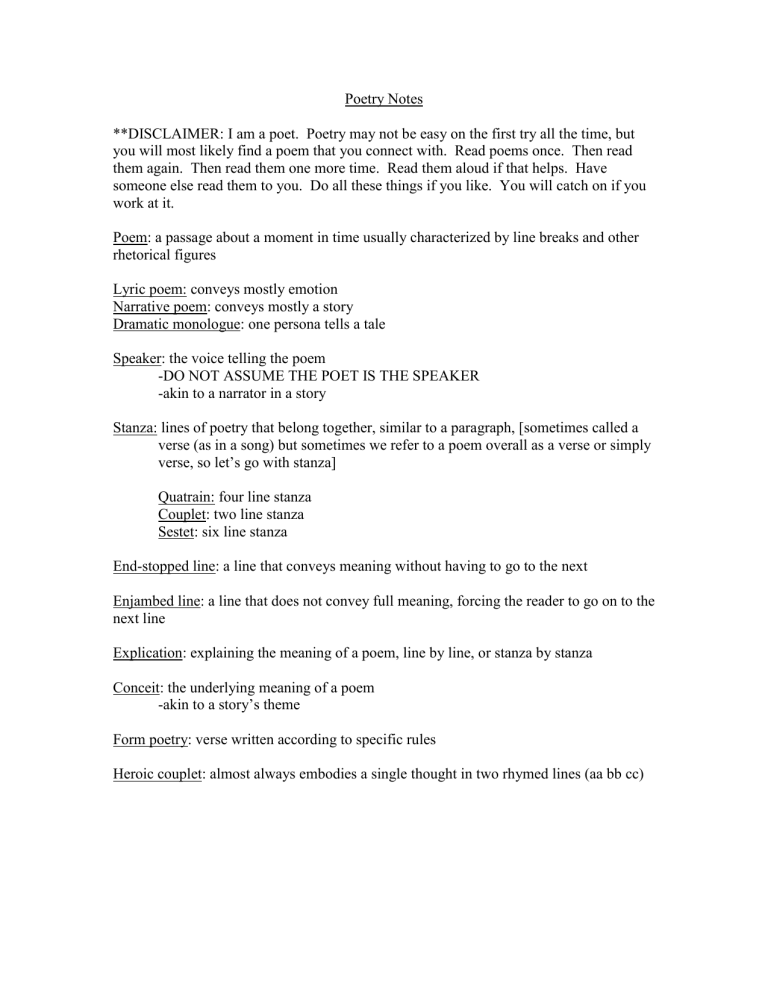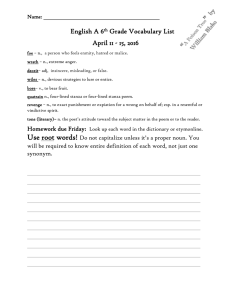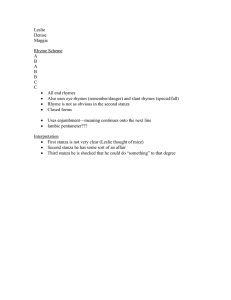
Poetry Notes **DISCLAIMER: I am a poet. Poetry may not be easy on the first try all the time, but you will most likely find a poem that you connect with. Read poems once. Then read them again. Then read them one more time. Read them aloud if that helps. Have someone else read them to you. Do all these things if you like. You will catch on if you work at it. Poem: a passage about a moment in time usually characterized by line breaks and other rhetorical figures Lyric poem: conveys mostly emotion Narrative poem: conveys mostly a story Dramatic monologue: one persona tells a tale Speaker: the voice telling the poem -DO NOT ASSUME THE POET IS THE SPEAKER -akin to a narrator in a story Stanza: lines of poetry that belong together, similar to a paragraph, [sometimes called a verse (as in a song) but sometimes we refer to a poem overall as a verse or simply verse, so let’s go with stanza] Quatrain: four line stanza Couplet: two line stanza Sestet: six line stanza End-stopped line: a line that conveys meaning without having to go to the next Enjambed line: a line that does not convey full meaning, forcing the reader to go on to the next line Explication: explaining the meaning of a poem, line by line, or stanza by stanza Conceit: the underlying meaning of a poem -akin to a story’s theme Form poetry: verse written according to specific rules Heroic couplet: almost always embodies a single thought in two rhymed lines (aa bb cc) Shakespearean Sonnet: 16 line poem of three quatrains and one couplet Volta: twist/turn in argument; usually occurs in the end of the third quatrain and the couplet Some poetry has specific rhythm. We call that poetic meter. Some poetry has a stress pattern. Shakespearean sonnets use iambic pentameter Iambic refers to iambs—two syllables; the first is unstressed, the second stressed For example, the word “alas” is an iamb. The words, “a boat” is an iamb. Pentameter refers to five iambs per line (pent means five). Therefore, one line of iambic pentameter has five iambs. Therefore, one line of iambic pentameter has ten syllables. One unit of a stress and meter pattern is called a foot. For example: Alas, my brain is weak and overworked. A boat has come to take the queen away. If you still can’t hear the stress pattern: A las a boat If you don’t stress the first syllable in the word “alas” it will sound like the name “Alice”—Alice is not an iamb (it’s a trochee, but you don’t need to know that) When we try to figure out the stress pattern and rhyme scheme, we scan a line. That’s called scansions. Poetic Meters and Patterns Iambic: 2 syl, unstressed, stressed (alas / a boat / has sailed / away) tetrameter Trochaic: 2 syl, stressed, unstressed (never / ever / never / ever / never) pentameter Anapestic: 3 syl, unstressed, unstressed, stressed (in an an/apest up/beats start out/in reverse) Dactylic: 3 syl, stressed, unstressed, unstressed (dactyls are difficult) dimeter Spondaic: 2 syl, stressed, stressed (John Keats) Pyrrhic: 2 syl, unstress, unstressed (not possible in the English language) Other forms of poems and their rules are listed at the end of these notes. Feel free to take a look at them. They are followed by a list of poems that are good for rounding out any poetic knowledge. They are not required, but they can be fun to read in the future. Rhetorical Figures Alliteration: repetition of consonant sound at the beginning of successive words: Peter Piper picked a peck of pickled peppers Allusion: reference to an outside source Anaphora: successive lines beginning with the same word Antithesis: balanced opposites: like ebony and ivory Apostrophe: addressing an abstract idea as if it were tangible: Oh, honesty, you are cruel Assonance: repetition of vowel sound at the beginning of successive words: Only Ollie owns one Catalog: list Chiasmus: a rhetorical construction in which the order of the words in the second of two paired phrases is the reverse of the order in the first: gray was the morn, all things were gray Diction: word or name choice Diminutio/litotes: negating the opposite: not unhappy Enumeratio: list (rhetorical handbooks) Hyperbole: drastic exaggeration: so hungry I could eat a horse Effictio/Blazon: enumeration of external qualities: her hair, her eyes, her lips Ethopoeia: internal qualities: her love, her luck, her courage Epic dis-simile: comparison of what something is not like using many lines Epic Simile: comparison using many lines; as x . . . . so y . . . . . Imagery: using sensory details to paint a picture with words Irony: the opposite of what you expect: In “The Story of an Hour,” Mrs. Mallard is happy to know that her husband is dead; when she finds he’s alive, she dies Juxtaposition: placing two very different images together: a butterfly on a corpse Metaphor: comparison not using like or as: the road is a ribbon Objective Correlative: using a specific word or phrase to evoke an universal image, that almost guarantees eliciting a specific emotion from the reader; the conviction that certain words are inherently tied to specific emotion Occupatio: writer excuses self from telling a particular story (then tells it anyway): I won’t go into how he got arrested last night Oxymoron: combining elements that don’t seem to go together: jumbo shrimp Polyptoton: use same base word in related words: the kind of person who is unkind Personification: giving inanimate objects human qualities: the sun smiles down Repetition: using the same word or phrase several times either consecutively or throughout Setting: when and where the story takes place Simile: comparison using like or as: teeth as white as pearls Symbol: a name or recurring object that stands for a larger meaning In Woman Warrior, the narrator describes a circular table, circular plates, a wedding ring, and a well; all symbolize the circle of life. Tenor: thing being described in a comparison Tone: the mood Vehicle: the thing that the tenor is being compared to Here’s that extra stuff I was talking about at the beginning of the notes. Villanelle (v) 19 lines, 5 stanzas of 3 each, last stanza has 4 Line 1 of stanza 1 = Last line of Stanzas 2 and 4 Line 3 of stanza 1 = Last line of Stanzas 3 and 4 Lines 1 and 3 of stanza 1 = last two lines of last stanza Aba rhyme scheme Began with Jean Passerat Sestina (ses) 39 lines, 6 stanzas of 6 lines each, envoi of 3 lines at end unrhymed same 6 end words in lexical repetition: Line 6 word of stanza 1 = line 1 last word of stanza 2 Line 1 last word of stanza 1 = line 2 last word of stanza 2 Line 5 last word of stanza 1 = line 3 last word of stanza 2 Line 2 last word of stanza 1 = line 4 last word of stanza 2 Line 4 last word of stanza 1 = line 5 last word of stanza 2 Line 3 last word of stanza 1 = line 6 last word of stanza 2 Envoi gathers and deploys all 6 end words 12th C troubadours; Arunaut Daniel in S of France Pantoume (pan) Unspecified length using quatrains Must have same beginning and ending line 2nd and 4th lines of first stanza = 1st and 3rd of next abab rhyme scheme Final stanza = unrepeated 1st and 3rd lines used in reverse as 2nd and 4th lines Malayan; Erest Fouinet Ballad (bal) Quatrains: 1st and 3rd lines = iambic tetrameter / 2nd and 4th lines = iambic trimester Abab or abcb Break, Blow, Burn Camille Paglia 100 Great Poems of the 20th Century ed. Mark Strand The Princeton Encyclopedia of Poetry and Poetics Good Poems Garrison Keillor Northern Elegies Anna Akhmatova All American Girl Disappearing Bad Weather Friends Julia Alvarez We Have Done Our Duty Yehuda Amichai The City Limits A R Ammons Residue Carlos Drummond de Andrade Alone Still I Rise On The Pulse Of Morning Maya Angelou Pantoume John Ashberry In Memory of WB Yeats (el) Musee des Beaux Arts W H Auden Drama Song 324 (el) John Berryman To The Dead (el) California Plush The Twentieth Century Frank Bidart In The Waiting Room One Art (v) The Weed The Fish Elizabeth Bishop The Once-Over Paul Blackburn The Chimney Sweep London The Tyger William Blake Evening In The Sanitarium Louise Bogan What Language Did Eavan Boland The Rooms of Other Women Poets The Story After The Story Author to Her Book (hc) Anne Bradstreet Here Follows Some Verses Burning (el) My Last Duchess (hc) Robert Browning Jabberwocky Lewis Carroll Fog (pas) Amy Clampett Move Lucille Clifton The Pink And The Black Henri Cole Wanda Why Aren’t You Dead Wanda Coleman Kubla Khan Samuel Taylor Coleridge Reading Scheme (v) Wendy Cope The Bridge (ode) Hart Crane Elegy for NY Douglas Crase America (ode) Robert Creeley In just Now is a ship Mid-way ee cummings Urban Pastoral Babette Deutsch Because I Could Not Stop For Death Alabaster Chambers Soul Selects Society Robert Desnos Emily Dickinson The Flea Holy Sonnet I Holy Sonnet XIV John Donne Farewell to Love Michael Drayton Warming Her Pearls Carol Ann Duffy The Taxi Russell Edson The Lovesong of J. Alfred Prufrock The Wasteland T. S. Eliot Missing Dates (v) William Empson Letter to Daphnis (hc) Anne Finch Directive (bv) The Road Less Taken Fire and Ice Robert Frost A Supermarket In California Allen Ginsberg Mocking Orange A Fable Louise Gluck Reading Plato Jorie Graham Lament The J Car (hc) Tom Gunn Villanelle (v) Marilyn Hacker The Convergence of the Twain Thomas Hardy Perhaps The World Ends Here (ode) Joy Harjo Meditations at Lagonitas (pas) Robert Hass Those Winter Sundays Robert Hayden Digging Seamus Heany More Light More Light Pig A Hill Anthony Hecht Church Monuments The Quip Love Easter Wings George Herbert Mr. Cogito Thinks About Hell I Would Like To Describe Zbigniew Herbert Things I Didn’t Know I Loved Nazim Hikmet By The Sound (v) John Hollander Pied Beauty Gerard Manley Hopkins Jazzonia Mellow I, Too Theme for English B Langston Hughes The Death of The Ball Turret Gunner Poem After Receiving A Voicemail… Poem For A Young Poet Bosnia Bosnia Randall Jarrell June Jordan Ode On A Grecian Urn (pas) John Keats After The Trial (ses) Weldon Kees Parents Pantoume Carolyn Kizer One Train May Hide Another Kenneth Koch From The Porch (pas) John Koethe My Makeup Rochelle Kraut Days Here Aubade Home Is So Sad Philip Larkin The Big Mystical Circus Jorge de Lima Arbole Arbole City That Does Not Sleep Federico Garcia Lorca Man and Wife Dolphin Robert Lowell Ars Poetica Archibald MacLeish You, Andrew Marvell Bagpipe Music (bal) Louis MacNeice Passionate Shepherd To His Love Christopher Marlow To His Coy Mistress The Garden (pas) Andrew Marvell The Method (pan) JD McClatchy Tropics In NY The Harlem Dancer If We Must Die Claude McKay A Quoi Bon Dire Charlotte Mew I Am Writing To You From A Far Off Country Henri Michaux Cameo Edna St. Vincent Millay What Lips My Lips Have Kissed (son) Encounter Elegy for N N Ars Poetica? Czeslaw Milosz Love Canal For A Daughter Who Leaves Janice Mirikitani Eel Eugeneo Montale Paper Nautilus (ode) Marianne Moore Epith Carol Muske Very Like A Whale Tale of Custard the Dragon Ogden Nash Ode To The Watermelon Curse The Song of Desperation Pablo Neruda Mexican Guitar Ave Maria Frank O’Hara Language of the Brag Sharon Olds Wild Geese Mary Oliver Undertaking in NJ George Oppen Morning Star Cesare Pavese Ode To Meaning The Shirt Robert Pinsky Daddy Metaphors Sylvia Plath Corner Ralph Pomeroy The River-Merchant’s Wife In A Station of The Metro Ezra Pound Heart of the Matter (pas) Susan Prospere Nani (ses) Alberto Rios Diving Into The Wreck Adrienne Rich Miniature Doxology Departures III Yannos Ritsos Cuttings Root Cellar Vistant Dolor Theodore Roethke Sestina of the Lady Peitry (ses) DG Rossetti Yes Muriel Rukeyser The Tornado Russell Breakfast of Runnersup Peter Schmitt Abortion Anne Sexton For My Lover Returning To His Wife Wanting To Die Supernatural Love Gjertrude Shackenberg Sonnet 73 Sonnet 29 Shakespeare Oxymandias P. B. Shelley Miracle Glass Co. (ode) Charles Simic Not Waving But Drowning To Carry The Child Pretty Stevie Smith April Inventory W D Snodgrass Disillusionment of 10 o’clock Anecdote on a Jar Postcard from the Volcano Wallace Stevens That Winter Ruth Stone Rain and the Tyrants Jules Supervielle At East River Question Swenson Old Pond Gary Snyder The End and the Beginning The Suicide’s Room Wislawa Szymborska Night Song In Amalfi Sara Teasdale Fern Hill Do Not Go Gentle (v) Dylan Thomas Rain (bv) Edward Thomas An Attempt at Jealousy Marina Tsvetaeva Rose Nocturnal Xavier Villaurrutia Paragraph Made Up Of 7 Sentences Chuck Wachtel Midsummer Tabago Derek Walcott Song of Myself O Captain My Captain (el) Walt Whitman Lying (bv) Richard Wilbur The Shrinking Lonesome Sestina Miller Williams The Red Wheelbarrow This Is Just To Say Spring and All William Carlos Williams Grandmother’s Song (pan) Nellie Wong The World Is Too Much With Us Westminster Bridge Wordsworth Looking West from Laguna Beach Ars Poetica Autumn Charles Wright From Pamphilia to Amphilanthus (son) Mary Wroth Peter and John (bal) Elinor Wylie The Second Coming Leda The Swan In Memory of Eva Gore Booth Circus Animals’ Desertion William Butler Yeats That’s How We Are Andrea Zanzotto The Day Zimmer Lost His Religion Wanda Being Beautiful Dog Music Paul Zimmer



